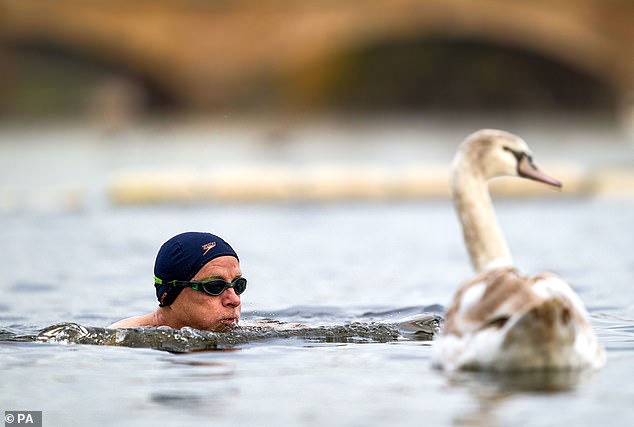Swimming in cold water ‘can combat symptoms of menopause’ (and NOT just hot flashes!)
Taking a dip in cold water seems like a sensible way to reduce hot flashes – now research shows it can reduce several symptoms of menopause.
Menopausal women who regularly swim outdoors had significant improvements in their physical and mental health, according to a University College London study.
A study of 1,114 women found that it reduced menopausal symptoms such as anxiety, mood swings and hot flashes by up to half.
They suggested it could be an effective treatment option, while also improving overall health.
The outdoors have exploded in popularity in recent years, linked to a host of health benefits, from improving circulation to boosting metabolism.

Menopausal women who regularly swim outdoors had significant improvements in their physical and mental health, according to a University College London study. Open water swimming usually involves swimming outdoors in rivers, lakes or the sea, where temperatures are usually lower than in swimming pools – a typical pool temperature is between 26C and 28C (79F and 82F)
Researchers wanted to test whether these potential health benefits could be a natural way to help relieve symptoms of menopause, including hot flashes and brain fog.
About 785 of those surveyed were menopausal, with almost two-thirds of women (63 percent) admitting they swam to relieve symptoms.
Nearly half of women (46.9 percent) experienced less anxiety, more than a third (34.5 percent) had fewer mood swings and a similar number reported fewer sad moods (31.1 percent) and hot flashes as a result ( 30.3 percent). from swimming in cold water.
Women reported finding the cold water “an instant stress/anxiety reliever” and described the activity as “healing,” according to the findings published in the journal Post Reproductive Health.
A 57-year-old woman said: ‘Cold water is phenomenal. It saved my life. I can do anything in the water. All complaints (physical and mental) disappear and I feel at my best.’
Most women probably swam in both summer and winter and wore swimsuits instead of wet suits, they found.
As well as helping with menopausal symptoms, the women said their main motivation for cold water swimming was to get outside, improve mental health and exercise.
Professor Joyce Harper, from UCL’s Institute for Women’s Health, said: ‘The majority of women swim to relieve symptoms such as anxiety, mood swings and hot flashes.
‘They felt their symptoms were helped by the physical and mental effects of the cold water, which were more apparent when it was colder.
‘Also important was how often they swam, how long and what they wore. Those who swam longer had more pronounced effects.
‘The great thing about cold water swimming is that it allows people to exercise in nature, and often with friends, building a great community.’
Cold water has previously been shown to improve mood and reduce stress in outdoor swimmers, and ice baths have long been used to promote muscle repair and recovery in athletes.
The researchers also wanted to investigate whether swimming in cold water improved women’s menstrual symptoms.
Of the 711 women who experienced menstrual symptoms, almost half said swimming in cold water improved their anxiety (46.7 percent), and more than a third said it improved their mood swings (37.7 percent) and irritability (37.6 percent). ) helped.
More research is needed into the frequency, duration, temperature and exposure required to reduce complaints, the researchers conclude.
Caution should be exercised when swimming in cold water, she added, because participants could be at risk of hypothermia, cold water shock, cardiac arrhythmias or even drowning.
Depending on where people swim, water quality standards can also vary, as pollution from raw sewage is an increasingly common problem in Britain’s rivers and seas.
Limitations of the study include that these women were already cold-water swimmers, rather than testing on people who have never done it before.
Professor Harper added: ‘We hope our findings can provide an alternative solution for women struggling with menopause and encourage more women to take part in sport.’
Half a million women in England have been able to access cheaper HRT since last April, saving £11 million.
The Prescription Prepayment Certificate, launched last year, gives women a year’s supply for £19.30 instead of having to pay the £9.65 prescription fee each time.
Health Minister Victoria Atkins said: ‘This is a huge milestone and shows how successful our Women’s Health Strategy is in delivering the outcomes women want and deserve.’
